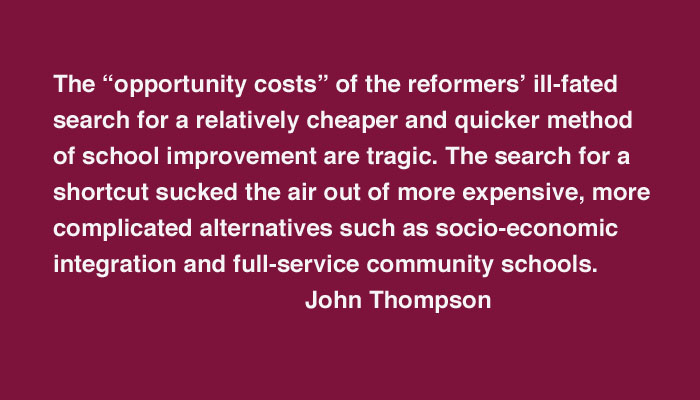Can the Tennessee Achievement School District Move Beyond the Silver Bullets?

By John Thompson.
Chris Barbic, the Superintendent of the Tennessee Achievement School District (ASD), is back in the news, and he is displaying remarkable candor in describing his assumptions. Barbic also explains how he remains devoted to his “hypothesis” on school improvement.
Coverage of Barbic’s efforts will inform the post mortem of the Race to the Top and the Obama administration’s “turnaround” experiments such as the School Improvement Grants (SIG). Even if one of Barbic’s “most challenging seasons” turns out to be less disappointing than his previous years, and he pulls out some sort of miraculous transformation of Memphis schools, it seems clear the RttT and the SIG aren’t going to survive. And, most likely, the high-dollar innovations led by Barbic will become classic case studies in how and why reform overreach is so fatal to school improvement.
Two valuable contributions to the “lessons learned” process that we need to undertake are Daarel Burnette’s Chalkbeat Tennessee interview with Barbic, and a series in Governing magazine by John Buntin. Both journalists provide more evidence that Barbic’s intentions are pure, that last year was extremely contentious for the ASD, and that Barbic now faces even bigger challenges dealing with community protests and with three charter operators – most notably YES charter schools – pulling out of Memphis schools.
In the past, Buntin says, the ASD’s effort to takeover neighborhood schools “had generated impassioned protests from some parents and teachers who faced the prospect of losing their jobs if the ASD or a charter operator took over. But none of the protests were well organized or had much of an effect. This year … a different tone has been set.”
Barbic still defends the setting of a seemingly utopian goal, bringing schools ranked in the bottom 5% into the top quarter of schools. It would be difficult enough to make such a transformation using a comprehensive set of science-based policies. But, as Buntin reports, Barbic is attempting to do so based on his theory that, “It’s the school leader. It’s teacher talent. It’s a common vision.” Free educators from administrative constraints and hold them accountable for outcomes, and this educator-driven, instruction-driven model could supposedly overcome the legacies of extreme poverty. Even more strange, Barbic seeks systemic transformation, not just dramatic improvements in individual schools.
To his credit, Barbic made some startling acknowledgements to Burnette. He now to admits to underestimating “the depth of the generational poverty” and how “what our kids bring into school every day makes it even harder than we initially expected.” He belatedly endorses the more expensive and complex policies that many social scientists and educators have long described as essential to turning around the Can the Tennessee Achievement School District Move Beyond the Silver Bullets? - Living in Dialogue:
